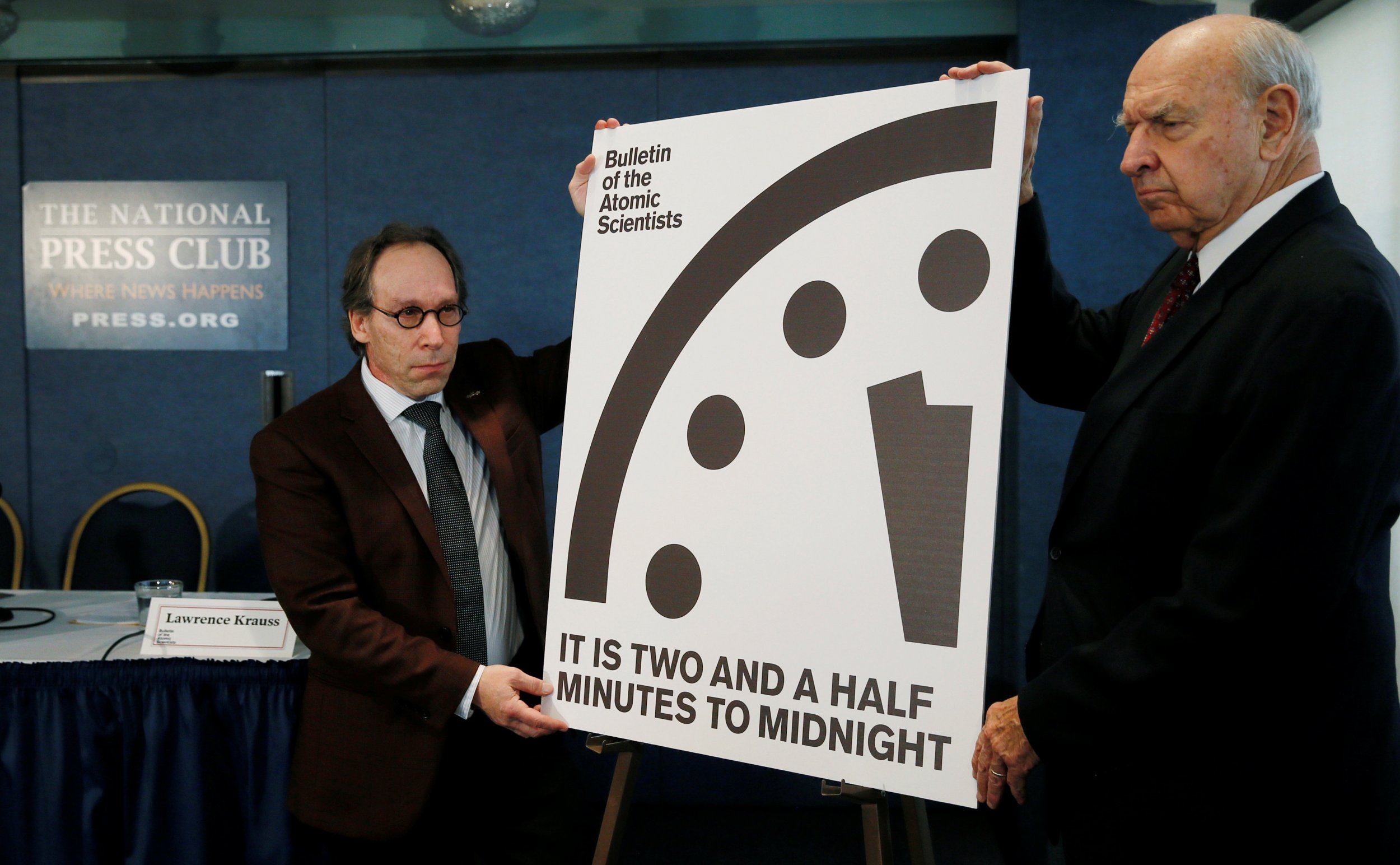
Humanity is edging nearer to destruction, according to the "Doomsday Clock." The "clock" is now at two and a half minutes to midnight (representing the destruction of Earth), the Bulletin of the Atomic Scientists said in its annual announcement. That is 30 seconds closer than in 2016—and the closest it has been since the Cold War. It was the first time the "clock" has moved by an interval of seconds and not minutes.
"Over the course of 2016, the global security landscaped darkened," Rachel Bronson, executive director and publisher of the Bulletin, said at a press conference Thursday. The international community has "failed to come to grips with humanity's most existential threats," which are nuclear arms and climate change, she added.
Related: Apocalypse soon: 'Doomsday Clock' kept at three minutes to midnight
Most troubling, Bronson said, has been "the cavalier and reckless language used across the globe, especially in the United States during the presidential election and after, around nuclear weapons and nuclear threats," as well as what she calls an increasing rejection of science and "the conclusions of intelligence experts" by President Donald Trump and others.
Since 1947, the Bulletin of the Atomic Scientists, a publication started two years earlier by scientists involved in the Manhattan Project, has gathered experts to determine how close humanity is to midnight. The experts initially evaluated the threat based on nuclear weapons. Several years ago, they expanded the criteria to include threats such as climate change.
That first year, the "clock" was at seven minutes to midnight. As the Cold War progressed, it got as close as two minutes to midnight, in 1953. "Only a few more swings of the pendulum, and from Moscow to Chicago, atomic explosions will strike midnight for Western civilization," the Bulletin said that year. In the 1990s, the "clock" was as much as 17 minutes from midnight.
It has moved much closer in recent years, due largely to rhetoric from North Korean leader Kim Jong Un. It was at three minutes to midnight for the past two years. Last year, the Bulletin cited. among its reasons, rising tensions between the U.S. and Russia, the conflicts in Ukraine and Syria, Turkey's shooting down of a Russian warplane and the Earth having what was then its warmest year on record.
Lawrence Krauss, chairman of the Bulletin board of sponsors and a professor at Arizona State University, noted at the press conference that this is the closest the "clock" has been since 1953, after the Soviet Union exploded its first hydrogen bomb, leading to the modern arms race. "This is the first time the words and stated policies of one or two people placed in high positions have so impacted on our perception of the existential threats we believe the world faces," Krauss said, most likely referring to Trump and Russian President Vladimir Putin.
Thomas Pickering, a member of the Bulletin board of sponsors who has held several U.S. government positions, including ambassador to the United Nations, said at the conference that North Korea's nuclear tests remain a threat and that the arms race between Pakistan and India is troubling. "Nuclear rhetoric is now loose and destabilizing," he said, citing Trump, who he said has "engaged in casual talk about nuclear weapons."
The Bulletin experts also said that Trump has increased the threat posed by climate change by publicly doubting the mainstream scientific community's position (he has repeatedly called global warming an "expensive hoax") and by nominating Cabinet members who also question that science.
"The Trump administration needs to state clearly and unequivocally that it accepts climate change caused by human activity as reality," David Titley, a Pennsylvania State University professor and a member of the Bulletin science and security board, said Thursday. He noted how 2016 was the warmest year on record, surpassing 2015 and 2014, which had also set records.
Krauss added that technological advances have also been threatening, such as self-driving vehicles, which could displace workers, and Russian intervention in the U.S. presidential campaign through hacking.
Before the announcement, 77 percent of people polled on the Bulletin's website predicted the clock would move closer to midnight.
The Bulletin published more information about its reasoning online, and Krauss said, "We therefore call upon all people to speak out and send a loud message to your leaders that you will not allow them to needlessly threaten your future and the future of your children."
Uncommon Knowledge
Newsweek is committed to challenging conventional wisdom and finding connections in the search for common ground.
Newsweek is committed to challenging conventional wisdom and finding connections in the search for common ground.
About the writer
Max Kutner is a senior writer at Newsweek, where he covers politics and general interest news. He specializes in stories ... Read more





